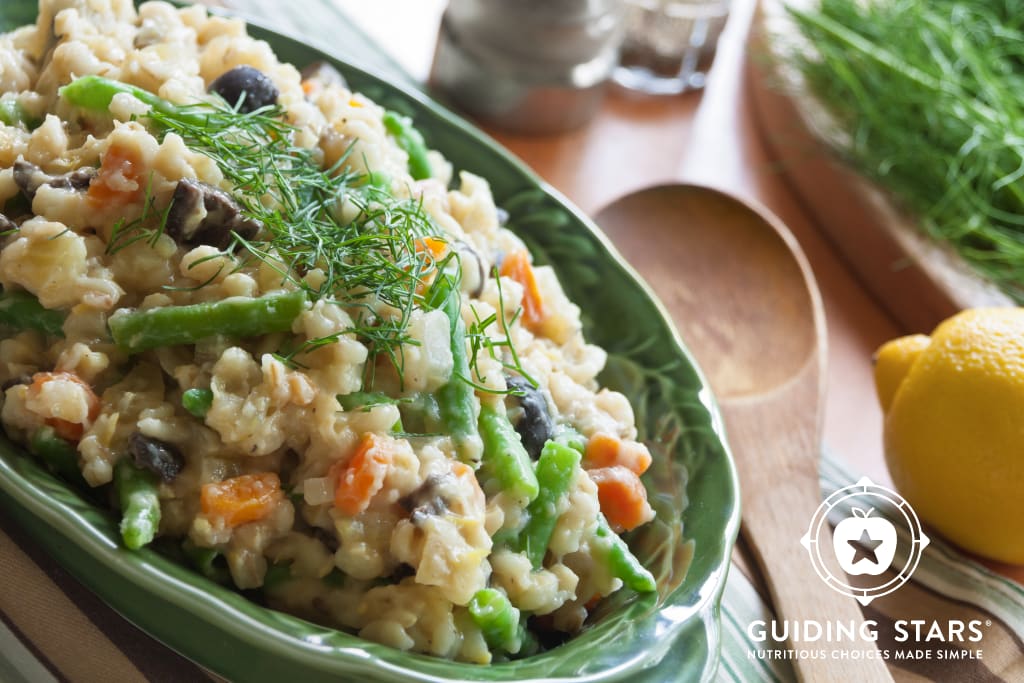You know that including more whole grains in your diet—and limiting refined grain products—is recommended for an overall healthful diet. Yet, though we eat enough grain foods, we’re not taking the advice of the Dietary Guidelines for Americans to “make half your grains whole,” which translates to 3 oz. of whole grains per day.
Fennel Barley Risotto
Consider making a risotto-like dish with barley for great texture, flavor, and nutrition.
View recipe »What’s so healthy about whole grains?
One of the main reasons that whole grains get the glory is that they are often (although not always) a good source of fiber—and yet 95% of Americans do not get the recommended amounts of fiber. Whole grain foods also naturally come packaged with nutrients that are stripped from processed grains, including healthy fats, vitamin E, B vitamins, several minerals like iron and zinc, and other natural plant components commonly referred to as phytonutrients, that may have health benefits. (Refined grains have nutrients, too, and some, including certain B vitamins and iron, are added back during the enrichment process, but fiber is not one of them.) Earlier this year a study was published that examined a variety of health effects such as cardiovascular disease as well as deaths and related them to the consumption of certain dietary components around the world. Across the 21 regions examined, a low intake of whole grains was the most common dietary risk factor for deaths (and was the number one risk factor in the US). Research studies also indicate that consuming more whole grains is associated with reduced risk of type 2 diabetes, lower cardiovascular disease and decreased risk of certain cancers, among other health benefits.
Get more whole grains in your diet.
So, to get the recommended 3 oz. (males 18-30 should aim for 4 oz.) of whole grains daily, what do you need to do? Here are some tips for upping your whole grain intake:
- Choose unprocessed whole grains instead of processed products that tout their “whole grain” content on the label. The reason for this is that lots of processed foods such as cereals, crackers, and granola bars have some whole grains in them, but it’s not always enough to make a real difference in your intake. Grains in their whole form are just simple bags of grains such as barley, millet, sorghum, teff, or wild rice. See the list below for more ideas. You can sometimes find them in bulk bins, too.
- Go for plain grains. Be careful when selecting seasoned whole grains mixes and microwavable options, as they often are much higher in sodium. Plain grains are the best choice—you can always add your own seasonings.
- Read the ingredient label on the package and choose grain products that list a whole grain as the first or second ingredient.
- Be extra careful with breads. The terms they use on packaging can be especially tricky. The term “wheat flour” in the ingredient list just means regular flour. Look for “whole wheat flour” or “white whole wheat flour” (it’s still whole wheat, just a lighter color and flavor), or look for another whole grain flour such as rye or oat. Also, the word “multigrain” does not necessarily mean it contains whole grains, and “made with whole grain” means there isn’t enough whole grain to equal a full serving of whole grains.
Whole Grains
- Amaranth
- Barley
- Buckwheat
- Bulgur
- Corn
- Einkorn
- Farro
- Millet
- Freekeh
- Kamut
- Kaniwa
- Oats
- Quinoa
- Rice
- Rye
- Sorghum
- Spelt
- Teff
- Triticale
- Wheat
- Wild Rice
Make simple swaps to boost your whole-grain game.
| Meal | Swap In | Swap Out |
|---|---|---|
| Breakfast | Whole-wheat English muffins | White English muffins |
| Breakfast | Amaranth or millet cooked as hot cereal | Farina or creamy wheat hot cereal |
| Breakfast | Buckwheat or white whole wheat pancakes | Regular white flour pancakes |
| Lunch | 100% whole grain bread or tortilla/wrap | White bread or white tortilla/wrap |
| Lunch | Bulgur, farro or quinoa salad | Potato salad |
| Lunch | Chicken and brown rice soup | Chicken noodle soup |
| Dinner | Barley “risotto” | Regular white rice risotto |
| Dinner | Teff burger patties | Beef or turkey burger patties |
| Dinner | Biscuits made with whole wheat pastry flour | Regular white flour biscuits | Dinner | Whole wheat or brown rice pasta | Regular pasta |
